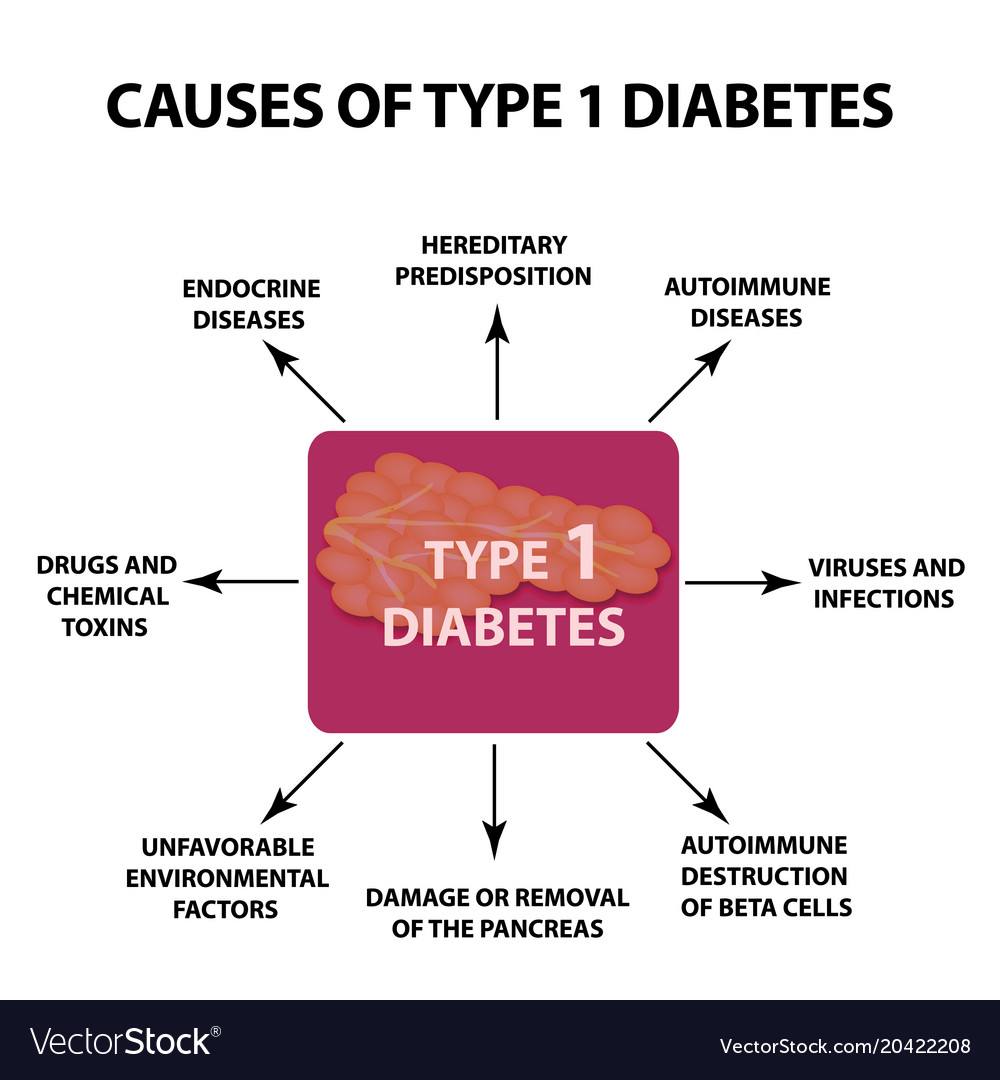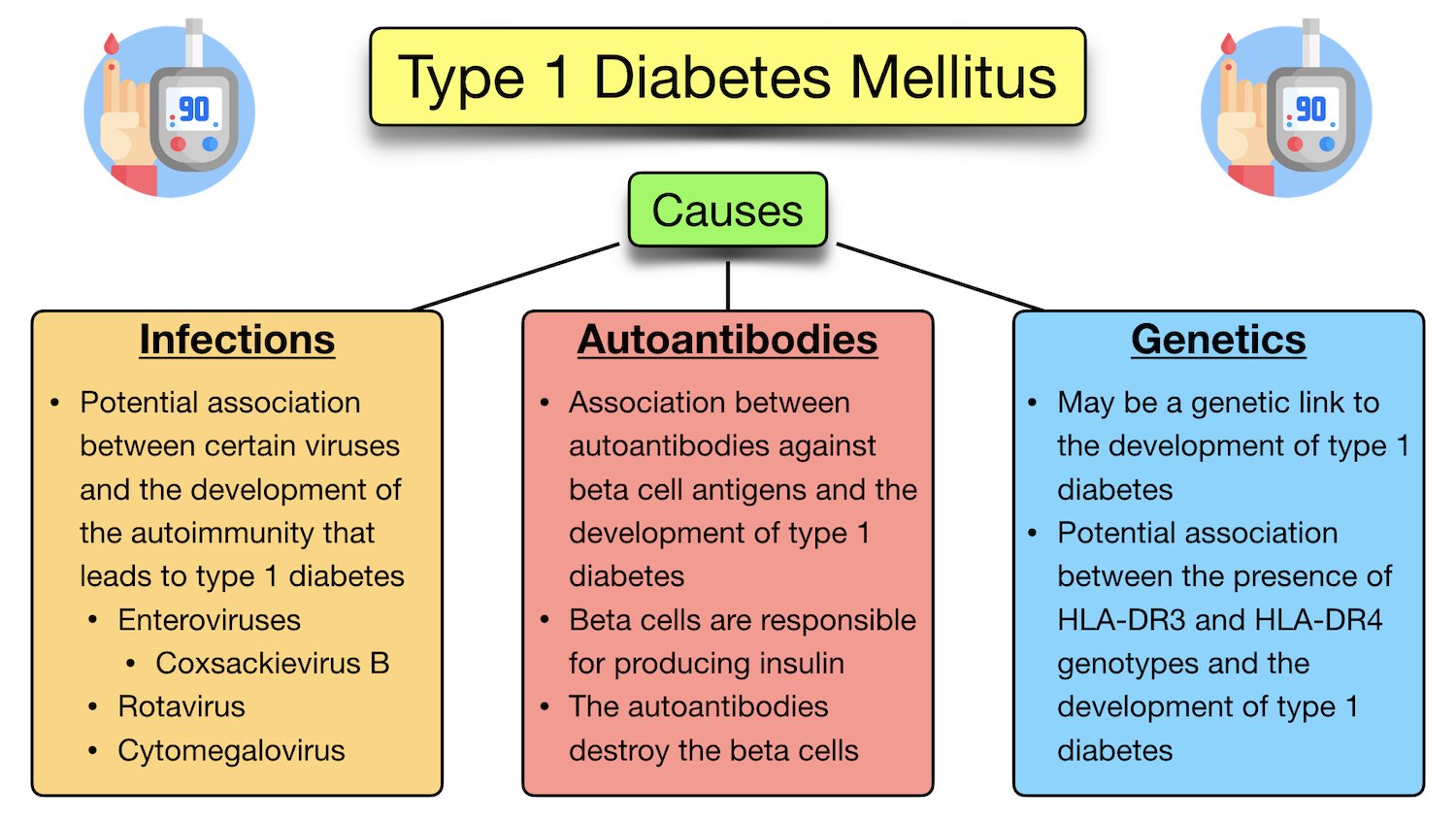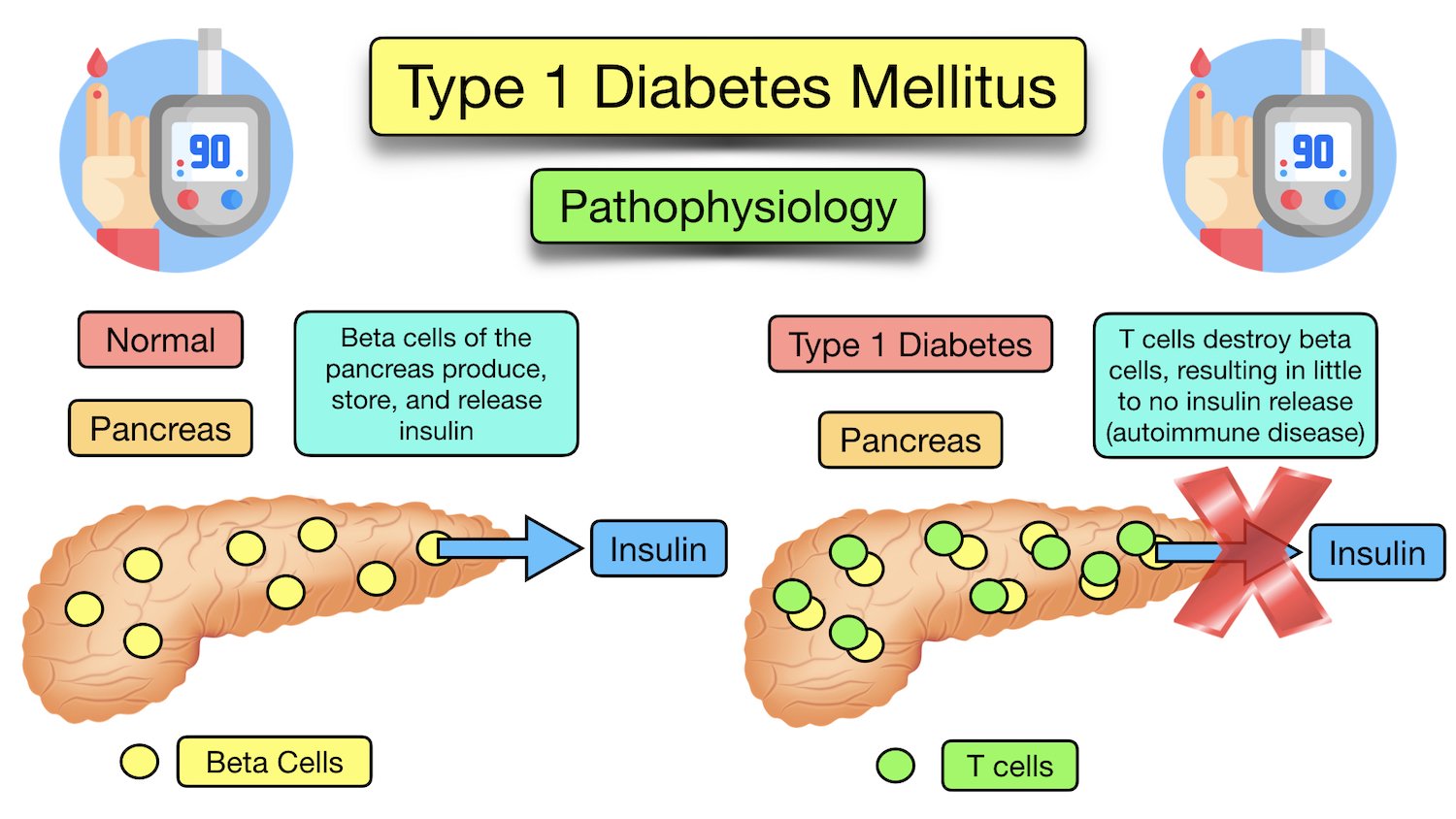What Causes Type 1 Diabetes? Unpacking The Factors
Have you ever wondered what truly sets the stage for type 1 diabetes? It's a question many people ask, and it's a very important one for those living with the condition, or for families who have a loved one affected by it. Understanding the beginnings of this lifelong health situation can feel a bit like trying to solve a puzzle with many pieces. We often hear about how serious it is, but the "why" behind it, that's what truly captures our attention, isn't it?
For a long time, there was, you know, a lot of uncertainty about what exactly triggers type 1 diabetes. People sometimes thought it was about lifestyle choices, which is actually quite wrong. This condition, you see, comes about through processes entirely out of a person's control. It's not something you can catch like a cold, nor is it brought on by eating too much sugar, that's a common misconception, isn't it?
Today, as a matter of fact, we have a much clearer picture, though not every single detail is known. We know it's not just one single thing that causes it, but rather a combination of elements working together. It's a bit like how, you know, a complex event like a fire might have many different reasons for starting, not just one factor. So, let's really look into the different parts that scientists believe play a role in type 1 diabetes developing.
- Did Laura Ingraham Get Married
- Gemmi Schottenheimer
- Austin Maddox
- Shawn Killinger Husband Joe Carretta
- Andi Avalon Wikipedia
Table of Contents
- Understanding Type 1 Diabetes: A Quick Look
- The Immune System's Role: A Misguided Attack
- Genetic Connections: What Your Genes Tell Us
- Environmental Triggers: Outside Influences
- The "Perfect Storm": When Factors Combine
- It's Not Your Fault: Dispelling Myths
- Current Research and Future Hopes
- Frequently Asked Questions
Understanding Type 1 Diabetes: A Quick Look
Before we truly get into the reasons, it's helpful to grasp what type 1 diabetes actually is. Basically, this condition means your body, you know, stops making insulin. Insulin is a very important hormone that helps the sugar from your food get into your cells to be used for energy. Without it, sugar builds up in your blood, which can cause serious health problems over time.
This situation is quite different from type 2 diabetes, which is often linked to insulin resistance or not making enough insulin. Type 1, on the other hand, is an autoimmune condition. It typically appears in children, teens, or young adults, but it can happen at any age, really. People with type 1 diabetes need to take insulin every day to live, that's just a fact.
The Immune System's Role: A Misguided Attack
One of the main things we know about what causes type 1 diabetes is that it involves the body's own defense system. Your immune system, which is supposed to protect you from things like germs and viruses, sort of gets confused. In type 1 diabetes, it mistakenly attacks and destroys the cells in the pancreas that make insulin. These special cells are called beta cells, and they are located in areas known as the islets of Langerhans.
It's a very precise attack, you know. The immune system targets these beta cells specifically, leaving other cells in the pancreas alone. This process happens gradually over months or even years before symptoms appear. By the time someone is diagnosed, a significant number of their insulin-producing cells are already gone, that's often the case.
Autoimmunity: The Body Against Itself
This kind of misguided attack is what we call an "autoimmune response." It's a situation where the body's defenses turn on themselves. For some reason, the immune system identifies the beta cells as foreign invaders, like a virus or bacteria, and starts to eliminate them. Scientists are still, you know, trying to figure out the exact trigger that sets off this autoimmune reaction in the first place.
There are certain markers, called autoantibodies, that can be found in the blood of people who are developing or have type 1 diabetes. These autoantibodies show that the immune system is actively attacking the beta cells. Their presence can actually indicate a person's risk for the condition even before any symptoms appear, which is pretty interesting, isn't it?
Genetic Connections: What Your Genes Tell Us
While the immune system is the direct culprit, it's not acting alone. Genetics play a very significant part in a person's susceptibility to type 1 diabetes. It's not like inheriting a specific gene that guarantees you'll get it, but rather, you inherit a predisposition. This means you have a higher likelihood of developing the condition if you have certain genetic markers, that's basically how it works.
Think of it like this: your genes can give you, you know, a certain hand of cards. Some cards make you more vulnerable to the immune system misfiring. But having these cards doesn't mean the game is over; it just means you're in a particular position. Many people carry these genetic markers and never develop type 1 diabetes, which is quite telling.
Specific Genes: The HLA Link
The genes most strongly linked to type 1 diabetes are part of a group called the Human Leukocyte Antigen (HLA) complex. These genes are found on chromosome 6 and are crucial for the immune system's ability to tell the difference between the body's own cells and foreign invaders. Certain variations of HLA genes, particularly HLA-DR3 and HLA-DR4, are much more common in people with type 1 diabetes, so they are often studied.
Having these specific HLA gene types, you know, makes a person more likely to develop the condition. However, it's really important to remember that most people with these genetic variations do not get type 1 diabetes. This clearly shows that genetics alone are not enough; other factors must be involved to trigger the disease process, apparently.
Family Patterns: A Shared Likelihood
Because of these genetic links, type 1 diabetes can sometimes run in families. If you have a parent or a sibling with type 1 diabetes, your own chances of developing it are a bit higher than someone without that family history. This doesn't mean it's a guarantee, by any means, but it does indicate a shared genetic background that might increase susceptibility.
It's not like, you know, a simple inheritance pattern where if one parent has it, the child automatically will. It's more complex than that, involving multiple genes and environmental influences. So, while family history is a risk factor, it's just one piece of the puzzle, truly. Learn more about diabetes management on our site, for instance.
Environmental Triggers: Outside Influences
Since genetics don't tell the whole story, scientists believe that something in the environment must act as a trigger for the autoimmune process in genetically susceptible individuals. This is where the mystery really deepens, because identifying specific environmental causes has been, you know, quite challenging. It's not a single factor that causes it, but a mix.
These triggers are thought to, like, kick off the immune system's attack on the beta cells. They could be anything from infections to elements in our diet or even toxins. The search for these environmental links is a very active area of research right now, as a matter of fact, and it's quite fascinating.
Viruses: A Potential Spark
Many researchers believe that certain viruses might play a role in triggering type 1 diabetes. The idea is that a viral infection could, you know, somehow trick the immune system into attacking the beta cells. This could happen if the virus shares similar molecular structures with the beta cells, leading to a case of "molecular mimicry." The immune system attacks the virus, but then also attacks the similar-looking beta cells.
Viruses like coxsackievirus B, enteroviruses, mumps, and rubella have been studied as potential triggers. There's some evidence suggesting a link, especially with enteroviruses, but it's not a simple cause-and-effect relationship. It's more like, you know, a virus might be one of the things that can start the process in someone who is already genetically predisposed, apparently.
Diet and Early Life: Exploring Connections
Another area of investigation involves early childhood diet and exposure. For example, some studies have looked at the timing of introducing certain foods, like cow's milk or gluten, to infants. The thought is that early exposure to certain proteins might, you know, somehow influence the developing immune system and potentially increase risk.
However, the evidence here is not conclusive, and there's no widespread agreement on specific dietary recommendations to prevent type 1 diabetes. It's a very complex area to study, as diet is so varied and there are many other factors at play. What's more, changes in infant feeding practices haven't really led to a decrease in type 1 diabetes cases globally, which is something to consider.
Other Environmental Ideas: Broadening the Search
Beyond viruses and diet, scientists are exploring other environmental factors. These include things like exposure to certain toxins, chemicals, or even the composition of the gut microbiome. The gut microbiome refers to the trillions of bacteria and other microorganisms that live in our intestines, and they play a very important role in our overall health, including our immune system.
Changes in the gut bacteria, perhaps due to diet or antibiotic use, could potentially influence immune responses. There's also research looking at the "hygiene hypothesis," which suggests that a lack of early exposure to certain microbes might, you know, lead to an overactive immune system. This is all still very much under investigation, but it highlights the wide range of possibilities researchers are exploring.
The "Perfect Storm": When Factors Combine
So, as you can probably tell, what causes type 1 diabetes isn't a simple answer. It's not just one factor that causes the condition, but rather a complex interplay of several elements. It's like a "perfect storm" where a person with a genetic predisposition encounters an environmental trigger, which then, you know, sets off the autoimmune attack on the beta cells.
This combination explains why not everyone with the "risky" genes gets type 1 diabetes, and why not everyone exposed to a suspected environmental trigger develops it either. It's the unique combination of these factors that appears to be key. The timing of these exposures also seems to be very important, particularly during critical windows of immune development in early life, apparently.
It's Not Your Fault: Dispelling Myths
It is absolutely vital to emphasize that type 1 diabetes is not caused by anything a person did or didn't do. It's not about eating too much sugar, or being overweight, or not exercising enough. Those are common misunderstandings, and they can be very hurtful to people living with the condition. Type 1 diabetes is an autoimmune disease, and it happens regardless of lifestyle choices, that's just the truth.
Understanding this helps remove the blame that sometimes, you know, gets unfairly placed on individuals or parents. It's a medical condition that arises from a complex interaction of genetic and environmental factors, completely outside of a person's control. It's really important to remember that, you know, to foster accurate understanding.
Current Research and Future Hopes
Scientists around the world are, as a matter of fact, working very hard to better understand what causes type 1 diabetes. They are looking into new genetic markers, exploring more environmental triggers, and trying to figure out exactly how the immune system goes wrong. This research is incredibly important because a deeper understanding of the causes could lead to ways to prevent the disease, or even cure it, someday.
For example, researchers are studying immune therapies that could potentially stop the autoimmune attack before all beta cells are destroyed. There's also work on vaccines that might protect against the viruses suspected of triggering the condition. These efforts offer a lot of hope for the future, you know, for those affected by type 1 diabetes. You can find more information about ongoing research at organizations like the Juvenile Diabetes Research Foundation (JDRF), for instance.
Frequently Asked Questions
People often have many questions about type 1 diabetes and its causes. Here are a few common ones:
Can stress cause type 1 diabetes?
While stress can affect blood sugar levels in people who already have diabetes, it does not actually cause type 1 diabetes. Type 1 diabetes is an autoimmune condition, not something brought on by emotional or physical stress. Stress might, you know, make existing symptoms more noticeable, but it doesn't create the condition itself.
Is type 1 diabetes preventable?
Currently, there is no known way to prevent type 1 diabetes. Because it's an autoimmune condition influenced by genetics and unknown environmental triggers, there aren't any specific actions a person can take to stop it from developing. Research into prevention strategies, such as immune therapies, is ongoing, but nothing is available yet, you know, for widespread use.
Can diet in childhood cause type 1 diabetes?
No, a child's diet does not cause type 1 diabetes. While some research has explored potential links between certain early dietary exposures and the risk of developing type 1 diabetes, there is no conclusive evidence that specific foods or eating patterns cause the condition. It's really important to remember that, you know, diet is not the cause.
Understanding what causes type 1 diabetes is a complex but crucial area of knowledge. It helps us move past old misconceptions and focus on the real science behind this condition. While we don't have all the answers yet, the ongoing research is bringing us closer to, you know, a future with better treatments and perhaps even a cure. If you're looking for more information, you could certainly check out this page on our site for additional resources and support.
- Jane Benyo Petty Wikipedia
- Manuel Dallori
- Linda Myers Kasem
- Kristi Noem Husband Occupation
- Tiffany Henyard Previous Offices

The causes of diabetes type 1 infographics Vector Image

Diabetes Mellitus Causes

Diabetes Mellitus Causes